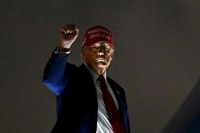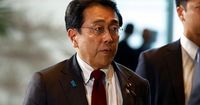U.S. President Donald Trump is set to personally attend a significant meeting with Japanese trade officials on April 16, 2025, amid ongoing tensions over tariffs and military support. This meeting, which will take place at the White House, underscores Trump's commitment to overseeing negotiations that have become crucial for both nations' economic futures.
Japan has dispatched its Minister of Economy, Trade, and Industry, Ryosuke Akazawa, to initiate discussions aimed at resolving disputes related to American tariffs and military costs. Akazawa is expected to meet with U.S. Treasury Secretary Scott Bisent to address these pressing issues. According to Reuters, Trump expressed hope for a beneficial resolution for both Japan and the United States, stating, "Japan is coming today to negotiate on American tariffs, military support, and trade benefits. I will participate in the meeting with the Ministers of Finance and Trade."
The backdrop to these negotiations is a complex relationship marked by Japan's significant investment in the U.S. and the presence of approximately 55,000 American troops stationed in Japan. This military presence has been a subject of contention, with Trump previously criticizing the financial burden it places on the U.S. He remarked, "We are defending them, but they are not obligated to defend us," highlighting the perceived imbalance in the U.S.-Japan alliance.
In response to Trump's comments, Japanese officials have rushed to clarify the nature of their security agreement, emphasizing that the mutual defense treaty already provides a framework for cooperation. Senior Cabinet member Yoshihisa Hayashi stated, "Japan and the United States are now capable of helping each other in a series of situations," underscoring the depth of the alliance.
As the meeting approaches, Akazawa has voiced concerns about the impact of U.S. tariffs on Japanese exports, particularly in the automotive and steel industries. The Japanese government is apprehensive that these tariffs could threaten its economic recovery, which heavily relies on exports. Akazawa noted, "Corporate profits are declining every day, and the government will work hard to achieve good results as soon as possible."
The tariffs in question have been a significant point of contention, with Japan facing a 25% tariff on cars and parts, as well as additional tariffs on aluminum and steel. Liberal Democratic Party policy chief Itsunori Onodera has stated that Japan does not intend to use its holdings of U.S. Treasury bonds as a bargaining chip in these negotiations.
Moreover, the Bank of Japan is reportedly preparing to revise its economic growth forecasts downward due to the uncertainty surrounding U.S. tariffs. Sources have indicated that the bank plans to maintain interest rates at 0.5% but may adjust its growth estimates for the current fiscal year, which began in April 2025. The bank's management remains divided on the potential damage from U.S. actions, particularly as the outcome of negotiations with Washington could significantly influence Japan's economic trajectory.
Analysts have warned that the ongoing trade tensions could lead to a reduction in Japan's GDP by as much as 1.8% by 2029. This potential economic downturn underscores the stakes involved in the upcoming discussions. As Akazawa prepares for his meetings, he has expressed confidence in achieving a mutually beneficial outcome while protecting Japan's national interests.
In addition to discussing tariffs, the negotiations may also touch on Japan's potential purchase of American natural gas from Alaska, as both countries seek to strengthen their economic ties. Akazawa's visit is seen as a critical moment for Japan to assert its position in the face of U.S. trade policies.
Meanwhile, Trump’s administration continues to face pressure from multiple fronts regarding trade practices and the U.S. trade deficit with Japan. The president has repeatedly criticized the trade imbalance, claiming that American companies suffer from unfair practices that allow other nations to maintain artificially low currency values. However, Tokyo has consistently denied any wrongdoing, asserting that it does not manipulate its currency.
As the negotiations unfold, the outcome remains uncertain. Should Japan manage to secure favorable terms, it could set a precedent for future discussions with other nations facing similar tariff challenges. Conversely, a failure to reach an agreement could exacerbate tensions not only between the U.S. and Japan but also with other trading partners.
In a broader context, the ongoing trade negotiations reflect a significant moment in U.S.-Japan relations, which have evolved over decades. The partnership, now entering its 65th year, has weathered numerous challenges, but the current climate of tariffs and economic competition presents new hurdles that both nations must navigate carefully.
As both sides prepare for what is expected to be a pivotal meeting, the eyes of the international community will be watching closely. The results of these discussions could have far-reaching implications, not just for Japan and the United States, but for the global economy as a whole. With both nations expressing a desire for a positive outcome, the hope remains that constructive dialogue will prevail amidst the complexities of international trade.





